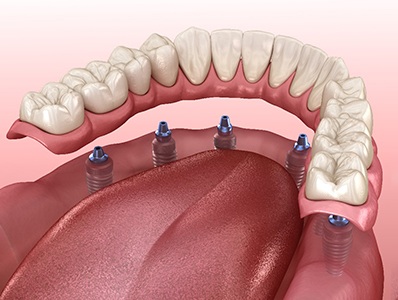Dental Implants — Annadale, VA
New Teeth That Will Last a Lifetime

Are you missing one or more teeth? Dr. Salari provides dental implants for Annandale, VA dentistry patients. Dental implants are a versatile restorative dental solution that replaces missing or lost teeth. They can be used on their own or to support dental bridges and dentures and offer many benefits to patients with lost teeth. Not only do they improve oral health by preventing shifting and overcrowding that is often caused by missing teeth, but they make it easier to bite, chew, and speak comfortably. Dr. Salari will help you find the best implant restoration to fit your needs. She takes the budget, goals, and history of her patients into account when planning treatment.
Why Choose Nova Smile Dental for Dental Implants?
- Implant Placement and Restoration Performed In-House
- Highly Experienced Prosthodontist Serving You Care
- Sedation Dentistry Available for Anxious Patients
What Are Dental Implants?

A dental implant is a type of tooth replacement that goes above and beyond what any traditional dental treatment can do. To replace teeth, a titanium post is surgically placed into the jawbone tissue and given time to heal and fuse with the bone. Then, an abutment (or small metal connector) is attached to the implant so it can hold a dedicated restoration, such as a crown, bridge or denture. Not only does replacing teeth in this way help you achieve a more natural-looking smile, but it restores your biting strength so you can eat your favorite foods without issue!
The 4-Step Dental Implant Process

Unlike getting dentures or a dental bridge, dental implants require a multi-step process that can take several months to complete. It may seem like a long time, but all of the benefits that you will experience are worth the wait! At Nova Smile Dental, we complete the entire dental implant process in-house instead of referring you somewhere else. Here are the four main steps you can expect when you get your new dental implants.
Initial Dental Implant Consultation

The first step in your journey is your dental implant consultation. During this appointment, we will look at your smile and surrounding facial structures. This will help us determine whether or not you make a good candidate for implants and where they should be placed in your mouth. During this visit, we are also happy to talk through the whole process, including the cost.
Sometimes, patients need preliminary procedures completed before they can proceed with the dental implant placement process. This could include bone grafting, gum disease therapy, and tooth extractions. Afterward, we can plan the rest of your treatment.
Dental Implant Surgery

When it’s time for your procedure, we will begin by numbing your mouth with a local anesthetic. Next, a small incision is made into the gum tissue to access your jawbone. The implants are placed at very precise angles and locations to fit in naturally with your smile. The final step is for your gums to be closed and protective caps to be placed over the implant posts to keep them safe throughout the duration of the healing process.
Dental Implant Osseointegration & Abutment Placement

For the next couple of months, the design process will take place between your implant and your jawbone. This process is known as “osseointegration.” This allows for your implants to maintain a sturdy foundation so that your replacement teeth stay in place when you speak and chew. When osseointegration is complete. The metal abutments will be placed on the ends of your implants.
Delivery of Dental Implant Restorations

After your abutment has been placed, your restoration should be ready to go. You may return to the practice where you will receive your new crown, bridge, or denture. At this time, we will check to ensure that your bite is comfortable so you can enjoy the benefits of your complete smile.
Benefits of Dental Implants

It’s easy to see why dental implants are becoming the gold standard for tooth replacement treatments. By restoring your pearly whites from the roots up, they can provide the most reliable and natural-like restorations for your new smile. Not only do they help you regain the majority of your biting power, but they can also preserve your jawbone and remaining permanent teeth in the long run. Read along to learn several important benefits of dental implants in Annandale you can expect to enjoy!
Day-to-Day Benefits

- Easy Maintenance : Your new teeth won’t require any special methods for cleaning them. By simply brushing and flossing them like natural pearly whites, along with regular checkups with Dr. Salari, you can keep a strong and healthy smile.
- Natural-Looking Solution : Your dental implants will look and feel like your natural teeth due to them being fitted with custom-crafted porcelain restorations. We’ll design them to match the rest of your smile, so you won’t even notice the difference.
- Improved Bite : Since they’ll be directly anchored to your jawbone, you’ll be able to regain 80% or more of your chewing power. This means you can enjoy all your favorite foods without worrying about your implants slipping or falling out.
Health Benefits

- Protect Remaining Teeth : Unlike dental bridges, your dental implants will not be supported by adjacent teeth. Not only will they avoid the need to alter your natural pearly whites, but they’ll also keep your remaining ones from shifting out of place.
- Maintain a Youthful Appearance : Dental implants are the only restorations that can help you maintain your jawbone structure after tooth loss. This will promote a healthier foundation for your smile as well as a more youthful face in the long run.
- Comfortable Tooth Replacement : Your metal posts will feel as natural as ever, so you won’t have to worry about experiencing oral issues like gum sores, tooth sensitivity, or jaw discomfort that tend to come with other replacement options.
Long-Term Benefits

- Effective & Reliable Results : Most patients with dental implants have a success rate of over 95%, even 10 years after being placed. Since you’ll only need to maintain them with minimal dental care, you can expect them to work for many years to come.
- Long-Lasting Solution : While your restoration can last 15+ years with proper maintenance, your dental implants themselves can last a lifetime. For this reason, this treatment is more cost-effective than your traditional options, as dental crowns, bridges, and dentures will need to be replaced every few years or so.
Who Dental Implants Can Help

Almost anyone with missing teeth can get dental implants. The prosthetics are great at restoring smiles, whether you lack a few chompers or many! That said, a dental consultation is the best way to confirm candidacy. The visit lets our team see if implants could work for you. If you’d like to learn more about it, we at Nova Smile Dental can help: here are the ideal qualities of treatment candidates and the implant types we might suggest. Look them over to get a better feel for the consult. Otherwise, you’re free to call our office for details!
Who is a Good Candidate for Dental Implants?

In general, most patients can meet the standards for implant surgery. You only need three things to be a good candidate for them. They are:
- Good Overall Health: Implant placement is a surgical procedure, so your body needs to be well enough for minor oral surgery.
- Strong Oral Health: If you have issues like cavities or gum disease, your implants could fail soon after surgery. Therefore, a dentist must address such conditions first.
- Sufficient Jawbone Tissue: Implants rely on a solid jawbone for support. As such, your jaw must have enough bone tissue. Otherwise, treatment won’t be successful.
Of course, you can get implants later if you’re not a good candidate now. For instance, our office could perform preliminary work like tooth extraction, gum disease therapy, or bone grafting before surgery. We’d even help you book these procedures to get you on track for getting a new smile.
Missing One Tooth

You need a standard implant post and crown if you only lack one pearly white. They’d replace your tooth seamlessly after placement.
Compared to a dental bridge, one perk of an implant is that it’s sturdier and longer lasting. The latter has an average lifespan of 15-20 years. Meanwhile, a bridge only lasts about five to seven years.
Furthermore, implants don’t involve enamel removal from nearby teeth. That puts them at odds with bridges, which shape surrounding chompers so the prosthetic can fit.
Missing Multiple Teeth

When you’re missing a few teeth in a row, you’ll benefit from an implant bridge – a dental bridge supported by two implants. It doesn’t rely on other teeth and preserves your enamel.
Of course, implants also help if you need more teeth across the mouth. In that case, several can anchor a partial denture in place.
Missing All Teeth

You may want to try an implant denture if you lack all your natural teeth (or you will soon). Unlike other kinds, this type is fixed with four to six well-placed dental implants. Therefore, it can restore an entire row of teeth at once.
This option is great if you’d prefer an alternative to regular dentures. You see, it doesn’t slip around or lose its fit like standard ones. You’d then enjoy a confident smile, only having to put up with a minimal number of implant posts.
Understanding the Cost of Dental Implants
Dental implant treatments can vary significantly from patient to patient, which means the price can also differ between cases. Several factors can influence the overall cost of dental implants in Annandale, such as preliminary procedures, the number of metal posts, and the kind of restoration you’ll need to restore your smile. Read along or schedule an initial consultation to learn what you can expect from the price range of this treatment. Our team will be glad to assess your oral health, discuss your smile goals, and can help you make the most of your benefits if you have dental insurance. Feel free to give us a call today if you have any questions!

Preliminary Treatments & Dental Implant Surgery

The success of your dental implants will depend on the health of your gums and jawbone. If you don’t have a sufficient amount of bone tissue or strong gums, then you’ll need preliminary treatments like bone grafting, periodontal disease therapy, or even tooth extractions. These can increase the overall cost of your procedure, but they’ll be essential for maintaining a long-lasting solution for your new smile.
The details of your dental implant placement surgery can also affect how much you’ll pay. This may include factors like the location your metal posts will be surgically placed as well as the kind of sedation used. Fortunately, our team can save you time and money by performing the complete dental implant procedure in-office.
The Parts of Your Dental Implant

Here’s how the various pieces of your treatment can influence the overall cost of your procedure:
- Type of restoration : Smaller options like dental crowns will cost less than larger ones like dentures.
- Number of dental implants : The more metal posts you require, the higher the price range becomes.
- The material or size : Dental implants that are made from zirconia, or are different from the usual size, can affect the cost.
- Brand of dental implants : Since we use trusted brands for the highest quality results possible, you can expect the overall cost to be higher compared to products from other manufacturers.
How Dental Implants Can Save You Money

While other restorations like dentures and dental bridges may be convenient at first, they won’t prevent dental shifting or further tooth loss like implants can. These options will also need to be replaced more frequently, which can hike up the overall price of your treatment. With dental implants, you can expect your restorations to last you 15 years or more with proper care. This alone can save you money and preserve your dental health in the long run!
Does My Dental Insurance Cover Dental Implants?

Although many dental insurance plans don’t cover the implants themselves, they may make some exceptions for parts of the treatment. Some policies can offer coverage for your initial consultation, sedation therapy, and your restoration(s). We understand the importance of being able to afford necessary treatments like dental implants. Feel free to consult our knowledgeable team so we can review your insurance plan to help maximize your benefits.
Dental Implants Post-Op Instructions

After dental implant surgery, your mouth needs to recover. This process ensures that your new teeth work correctly. That said, you don’t need to worry - our office will walk you through your recovery. We’ll tell you what to expect, which symptoms are typical, and ways to improve your healing. These dental implant post-op instructions will make sure you can enjoy your restored smile. So, please keep reading to learn more and call our office if you need guidance.
What to Do Directly After Dental Implant Surgery

Once your dental implants are placed, you need to leave the forming blood clot alone. Touching it will delay or even reverse your recovery. Therefore, remember to follow these rules:
- Keep your fingers and tongue away from the surgical site(s) for a few days.
- Don’t smoke during the first 24 hours after surgery.
- Don’t use drinking straws; their suction force can dislodge the blood clot.
- Avoid spitting; swallow your saliva or use a tissue for dabbing if necessary.
Common Side Effects When Recovering from Dental Implant Placement

You’ll likely have some mild side effects after dental implant placement, especially during the first few days. They may include:
- General Discomfort – It’s normal for the implant site(s) to ache a little after surgery. To ease any soreness, use store-bought pain relievers.
- Intermittent bleeding – Soon after placement, your treatment site(s) could bleed slightly. Lessen that bleeding by applying gauze and light pressure.
- Gum or Facial Swelling – In the first 72 hours post-surgery, your gums and face could swell slightly. Should that happen, apply a cold compress to reduce the swelling.
These effects are temporary and should fade after a few days. If they don’t or get worse, please contact our office.
Your Diet After Dental Implant Surgery

You should stick to a soft diet in the first few days after your surgery. Chewing anything abrasive or tough could dislodge your blood clot and ruin your recovery.
Items you could have with a soft food diet include:
- Scrambled Eggs
- Yogurt
- Soft Cheese
- (Non-hot) Soup
- Smoothies
- Sweet Potatoes
- Mashed Potatoes
- Pasta
- Pudding
- Ice Cream
You can resume a normal diet after a few weeks or when ready. Still, please limit crunchy and tough foods. You also shouldn’t chew directly on the implant site(s).
Post-Op Health & Oral Hygiene

Your mouth still needs daily cleaning even as it heals from surgery. In other words, you should practice good oral hygiene while you recover. Just make a few changes to the usual routines. These would include:
- Brush your teeth twice daily, though be careful near the surgical site(s).
- Rinse your mouth 2-3 times daily, preferably after meals. You can use a prescription mouth rinse if you have one.
- Don’t use mouthwashes that contain high levels of alcohol (i.e., Scope, Listerine, etc.)
What to Do After Your New Teeth Are Attached

The hard part is over when your new crown, bridge, or denture is attached. At that point, the most you’ll face is some minor gum sensitivity – a symptom that fades quickly. There shouldn’t be any swelling, bleeding, or extensive recovery. Instead, you’ll be ready to smile the same day!
Maintaining & Caring for Your Dental Implants

Your new dental implants can keep your smile complete, strong, and healthy for a lifetime. However, this is only possible if you take proper care of them! Failing to do so can allow your implants to be damaged or infected, potentially causing implant failure or the need for replacement. To help you avoid this, our team at Nova Smile Dental has laid out some important guidelines for you to follow to ensure your newly rebuilt smile lasts for years to come!
Make Oral Hygiene a Priority

While dental implants themselves can’t get cavities, maintaining excellent oral hygiene is still vitally important. Issues like gum disease can compromise your implant’s stability. So, be sure to brush and floss daily, paying special attention to your gumline. Afterward, use an antibacterial mouthwash to reduce plaque buildup. Doing this and visiting Dr. Salari at least twice a year for checkups and cleanings will help keep your oral health—and your implants in top condition.
Eat a Healthy Diet

Dental implants allow you to enjoy a full, nutritious diet without restrictions. However, it’s important not to overindulge in hard, sticky, or sugary foods, which can stick to your teeth or cause other issues for your implants. Focus on filling out your menu with foods rich in calcium and vitamin C to support a strong jawbone and healthy gums. A balanced diet supports both your bodily health and the longevity of your implants going forward.
Break Bad Habits

Certain oral and lifestyle habits can jeopardize the success of your implants. This is why we encourage our patients to reduce the frequency of their smoking habit or quit altogether. This is because the chemicals in cigarettes can slow down the healing process and increase the risk of infection. In addition, avoid using your teeth as tools or chewing on hard objects, which can damage your implants and restorations. Being mindful of these habits and working toward stopping them will help protect your dental investment.
Protect Your Dental Implants

Dental implants are durable but not indestructible. If you play sports, wearing a custom mouthguard can protect your implants from impact. For patients who grind their teeth (bruxism), wearing a nightguard can prevent excessive wear and tear on their implants. By taking these protective measures, you can significantly extend the life of your new prosthetics.
Schedule Regular Dental Checkups

Regular checkups and cleanings every six months are essential for making sure your implants are secure. During these visits, we can detect any potential issues early and address them before they get worse. Consistent professional care, combined with a diligent at-home hygiene routine, ensures that your dental implants remain in excellent condition for a lifetime!
Dental Implant Failure & Salvage

Dental implants boast an impressive success rate of more than 95%. Yes, you can rightly expect your new teeth to serve you well for many years. However, it must still be acknowledged that in rare cases, an infection or other sad circumstances lead to dental implant failure. If you ever believe that something is not quite right with your implants, call our team right away. We will evaluate the problem and recommend your next steps. Our goal is to get your oral health and function back on track as quickly and conservatively as possible.
Learn More About Dental Implant Failure & Salvage
Dental Implant Frequently Asked Questions

What Can I Use for Teeth While the Dental Implants Heal?
Many options are available, and they are tailored to your specific requirements. If you need a replacement tooth while the implants are healing, temporary removable teeth or a temporary bridge can be made. If all of your teeth are missing, we can usually modify your present complete denture or make you a new temporary denture. If you would prefer non-removable teeth during the healing phase, temporary transitional implants usually can be placed along with the permanent implants, and temporary teeth may be made and inserted the same day. Depending on your particular situation, some implants can be placed and “loaded” immediately. This means a temporary or permanent replacement tooth can be placed on, or shortly after, the day the dental implant is placed.
What are the Potential Problems After Dental Implant Surgery?
Although it is natural to be concerned about the pain that may be caused by these procedures, most patients do not experience severe or significant post-operative pain. Pain medication and antibiotics will be prescribed for you to make your recovery as easy as possible.
Occasionally, some people develop post-operative infections that require additional antibiotic treatment. Even though great care is taken to place the implant precisely, occasionally adjacent teeth are injured in the placement process. In addition, there is a chance that the nerve in the lower jaw, which provides sensation to your lower lip and chin, may be affected. If you are missing quite a lot of bone, it might be difficult to place an implant without infringing on the nerve space. Although we take great care to avoid this nerve, occasionally it is irritated during the procedure, resulting in tingling, numbness or a complete lack of sensation in your lip, chin, or tongue. Usually, these altered sensations will resolve within time, but they can be permanent and/or painful. If you notify us of post-operative numbness as soon as possible, it will allow us to manage your care in the most appropriate way.
When are the Replacement Teeth Attached to the Implant?
The replacement teeth are usually attached to the implant when adequate healing has occurred and your jawbone is firmly fused to the implant. Depending on a variety of factors, it may be possible to begin this phase of your treatment immediately or shortly after implant placement. We will review the most appropriate treatment sequence and timing for your particular situation.
The dental work required to complete your treatment is complex. Most of the work involves actually making the new teeth before they are placed. Your appointments are considered more comfortable and more pleasant than previous methods of tooth replacement. Frequently, this process can be performed without local anesthesia.
Your restorative treatment begins with specialized impressions that allow Dr. Salari to produce a replica of your mouth and implants. We will also make “bite” records so that we see the relationship between your upper and lower jaws. With this information, we will make the abutments (support posts) that attach your replacement teeth to your implants. Various types of abutments exist. Frequently, we can use “off the shelf” abutments. Other times, custom abutments must be made of gold or a tooth-colored ceramic material. As you can imagine, these custom-made abutments add to the cost and treatment time involved. Which abutment to use is a decision that often cannot be made until after healing is complete and impressions have been made.
The number of appointments and the amount of time required for each appointment is different for each patient. No two cases are exactly the same and regardless of the number of teeth replaced, the work must be completed with great precision and attention to detail. If you are having only a few teeth replaced, as few as three short appointments may be required. Between appointments, we will need time to complete the necessary lab work to make your replacement teeth. It is most beneficial that you keep all of your scheduled appointments.
If your final restoration is a removable denture, you will need to come to as many as five dental office appointments (although it may be fewer) over the following several months. During these appointments, we will perform a series of impressions, bites and adjustments in order to make your new teeth, as well as the custom support bars, snaps, magnets, or clips that will secure your teeth to the implants. During this period, every effort will be made to ensure you have comfortable, temporary replacement teeth.
In general, once your implants are placed, you can expect your tooth replacement treatment to be completed anywhere from 1 to 12 months. For these reasons, it is difficult for us to tell you exactly how much the restorative phase of your treatment will cost, although you should receive a reasonable estimate from our dental office. It also is difficult to give you a specific timeframe for completion of your treatment until after the implants are ready for restoration.
How Do I Clean My New Teeth?
As with natural teeth, it is important that you clean implant-supported restorations regularly with toothbrushes, floss and any other recommended aids. You should also visit your dentist several times each year for hygiene and maintenance. As with regular dentures and other tooth replacements, your implants and their associated components are subject to wear and tear and eventually will need repairs, including clip replacement, relines, screw tightening, and other adjustments.
Request a Dental Consultation Today
Call Dr. Salari at 703.763.0800 or schedule a dental appointment on our website today. Please let Dr. Salari and her team know if you have any more questions. They will be happy to assist you.
